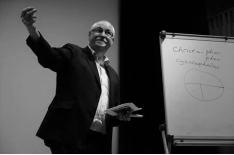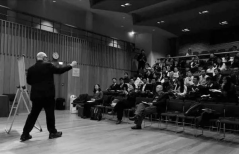Liu Shiyi: Pressure at the University of Oxford
—Grades on the Robe
I made a ten-day visit to the University of Oxford from January 21 to 30, 2019. I benefited a lot from this trip—I learned how Oxford manages itself and more importantly, the differences between Chinese culture and British culture as well as my thoughts on Chinese education in this period.
(I) Sources of the learning pressure for Oxford students
I'm not going to touch on the rules for teaching at Oxford because my senior Xinya schoolmates have already described them in their reports and those online papers have provided in-depth analysis. However, when we look closely at Oxford's scoring system, we will find that Oxford students pay no less attention to scores and learning than Chinese students although they seem to be very relaxed and pressure-free at ordinary times (the letter grades depend on an exam three years later). As I was shown around Oxford's colleges, a person mentioned that his college has an excellent sports tradition. Shortly after saying that, he switched to a new topic, "But in the eyes of the students, sports are no more important than learning." It sounded like a joke, but the joke shows that students in Oxford, like students in other parts of the world, face great learning pressure.
According to Oxford's evaluation system, Oxford students' letter grades only depend on the final examination before graduation, and they also don't attend large lectures. How come they face such huge learning pressure? By the way, Tsinghua University also attaches equal importance to sports and learning. So why does an Oxford college with strength in sports say learning is paramount for college students?
I identified two reasons during my visit:
First, the student of each college who takes the last place in the final examination will flunk out of the university. This means competition is fierce at Oxford. No doubt flunking out is a great blow to a student. No one wants to flunk out. Therefore, this system has put students under enormous pressure. Besides, I learned that some Oxford colleges associate campus life with academic achievements. For example, the choice of dormitory depends on the ranking of grades: Those who top the list are naturally entitled to the choice of a pristine, sunny, and spacious dormitory, and those who rank poorly, of course, have not much choice; the length of the robe worn at a formal dinner is determined by performance: The higher the grade, the longer the robe. Hence, Oxford students jokingly say "Oxford students wear grades on the robe". As a result, Oxford students may be driven by vanity to vie with others in the ranking of grades, thereby leading to an atmosphere where performance is seen as paramount at Oxford.
Second, the tutorial system of Oxford plays a significant role in promoting learning. Oxford students submit "assignments" to their tutors, not to teaching assistants, seniors, or classmates as is the case in China. Tutors represent authority from a cultural point of view and also play a decisive role in students' scores, final grades, and scholarships from the perspective of Oxford's scoring system. Therefore, the students cannot afford to slack off.
If a teaching system can be divided into the three stages of pre-teaching, during-teaching, and post-teaching, Oxford students complete the first two stages through autonomous learning and the tutor's enlightenment and conclude the third stage under the supervision of the tutor. Chinese universities adopt the typical "large lecture" model. The "pre-teaching" stage is called "preview", something that only excellent students do. The "during-teaching" stage is completely steered by teachers and few students participate in it. The "post-teaching" stage is completed by teaching assistants. Usually, students rush to preview the course and submit assignments at the end of the semester. In the British model, the motivation for learning is awe and respect for the tutor, values, and the sense of shame, and in the Chinese model, the motivation for learning is grade point average, postgraduate recommendation, studying abroad, and satisfactory transcripts. In my experience, the former perhaps can promote learning more substantially and profoundly.
(II) Lectures at Oxford
At Oxford, there are lectures almost every day, which show me Oxford's teaching methodology. However, these large lectures at Oxford are not essentially different from the small and medium-sized lectures at Chinese universities. Therefore, few courses have left a deep impression on me. The classrooms where I had classes were dim and boring due to the lack of enough windows and the need for showing PPT slides. Besides, I myself had some personal problems. Some courses did not achieve the desired effect.The poor lighting and lack of enough windows in the classrooms have something to do with the long history of the buildings. This explains why Oxford students are not interested in lectures from the perspective of these details.Compared to the spacious and well-lit classrooms in Chinese universities, Oxford's classrooms are too dim due to historical reasons and cannot stimulate enthusiasm on the part of the students. In my opinion, it takes enthusiasm to focus during classes.
Nevertheless, some lectures were impressive and amazing. For example, I found the two lectures on Beowulf and poetry were wonderful classes on history and culture. The professor giving the lecture on Beowulf left me with a deep impression. He employed measured cadences when reading an epic in ancient English, and "reproduced" the behavior of monsters and Beowulf. By combining visual and auditory effects, he helped the students gain a deeper understanding of the epic in an easy-to-understand way. Chinese universities can also adopt this teaching method for large lectures. That's because the lecture got remarkable effects despite limited interaction between the lecturer and students.


Professor Andy Orchard reads and analyzes the epic Beowulf for Xinya students
The lecture on poetry took a form similar to that taken in primary and secondary schools in the West. Specifically, the lecturer encouraged the students to air their views from different angles so they can gain a profound and diversified understanding of one and the same poem. In the discussions, the students can firsthand experience how diversified interpretations of a literary work can be. As I tried to figure out why the lecture can achieve such excellent effects, I realized the importance of guiding students to "speak" and "listen". The lecturer (out of the intention to encourage free expression, probably) said, "Whenever someone comes up with a different idea, I would feel amazed, realizing that the same issue can be explored from a different perspective. And often I would embrace the different idea in admiration." This remark is instrumental in helping us understand the real significance of teaching and guiding students. I felt inspired. It was really admirable. The lecturer often began by saying something with the subject of "I", sharing with the students her own experiences and feelings rather than lecturing on them. In this way, the understanding reached a higher level. Sharing, not cramming, is a method that we can also adopt.
(III) Significance of this visit

Prof. Gan Yang encouraged us to forget about pressure when performing the tasks. Our senior schoolmates had goals to achieve and must write a paper of 5,000 characters. Compared to them, we had an easier task. But it is right because of this that we can think outside the box. We looked at Oxford's systems and forms out of sheer curiosity. We marveled at it, and sometimes we felt a deep regret at it or a strong interest in it. Anyway, we developed a complete picture of the real University of Oxford, Oxford Town, London, and Britain.
First, allow me to talk about life at the University of Oxford. The students at Oxford live a wonderful life. You may get acquainted with someone you never saw before in a formal dinner at his college and invite him over for a formal dinner at your college. He would also invite you for dinner, naturally. This way, you can make a new friend. Dinner is not important; what matters is the chat.
For student associations, each college has its own team which trains regularly. Some colleges even have rowing teams, which gather on the riverbank in the early morning to practice rowing—like a Chinese dragon boat team.
Public houses line up the streets. Many people come here at night to drink, and wine culture is amazingly popular here. The restaurants often offer only wine and carbonated drinks; I never saw any fruit juice, milk, or milk tea. Such moments in life constitute a real and fresh Oxford. Oxford is both traditional and inclusive. There are sacred choirs and also crazy parties at night; there are teachers who encourage their students enthusiastically and also tutors who give grades according to Oxford's rules on scores... This is a completely different world.
Second, allow me to talk about our life. These activities brought about the establishment of the Xinya community. We chatted about our ambitions at night, shared the exciting stories we saw on the day, and solved seemingly unsolvable problems together. The concept of collective life and the consciousness of cooperation began to sprout in our hearts. We talked about the lectures we attended and what happened during the day. Our communication always led to new discoveries, and all of us spoke from our own perspectives. The exchange of ideas enabled us to see clearly what we have experienced or see and measure them in a different way.
The common room is a must-visit for each Oxford college. It displays something representative of the college and highlights the college's characteristics. There is always a group of people discussing something while drinking coffee. Sometimes they are serious, and sometimes they are hilarious. Perhaps, the reason why Oxford's education system is specialized but its students are not having something to do with this. In this seemingly dull "tea party", the exchange of ideas goes on, liberating the mind and opening up a broad horizon. The B&B we rented during our study tour in Britain is similar to such a common room. Can Xinya College build more common rooms and hold more "tea parties"? This is worthy of our consideration. We have different academic backgrounds, which is a unique advantage. Moreover, the colleges at Oxford are communities, and Xinya College is also a community. The visit broadened our horizons in this regard and also made us closer. This is just one aspect of the study tour, but its significance is profound.